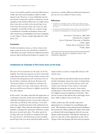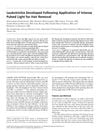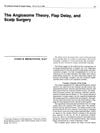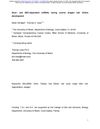 78 citations,
September 2006 in “International Journal of Cosmetic Science”
78 citations,
September 2006 in “International Journal of Cosmetic Science” Dandruff is mainly caused by a scalp reaction to yeast, can worsen hair loss, and antifungal treatments may help.
[object Object]  46 citations,
November 1997 in “Journal of Neural Transmission”
46 citations,
November 1997 in “Journal of Neural Transmission” Seborrhea in Parkinson's disease may be linked to hormones, not autonomic impairment.
 October 2001 in “WORLD SCIENTIFIC eBooks”
October 2001 in “WORLD SCIENTIFIC eBooks” Many substances, including chemicals and metals, can cause skin reactions; careful handling and identification of allergens are crucial to prevent dermatitis.
 5 citations,
July 2014 in “Acta Crystallographica Section D-biological Crystallography”
5 citations,
July 2014 in “Acta Crystallographica Section D-biological Crystallography” Mutations in the enzyme don't significantly change how it binds to its specific substances.
 73 citations,
April 1999 in “Dermatologic Clinics”
73 citations,
April 1999 in “Dermatologic Clinics” Lasers and light sources can effectively remove hair, work best on fair skin with dark hair, and usually need multiple treatments.
February 2024 in “Neurophotonics” Light therapy on the brain shows promise for treating brain diseases and improving brain function.
 September 2023 in “International Journal of Applied Pharmaceutics”
September 2023 in “International Journal of Applied Pharmaceutics” The formulated gel is a promising treatment for alopecia areata.
 December 2015 in “Dermatologic Surgery”
December 2015 in “Dermatologic Surgery” Double trichophytic closure effectively repairs thin scalp scars, reducing financial burden.
 4 citations,
October 2018 in “Experimental Dermatology”
4 citations,
October 2018 in “Experimental Dermatology” Dermoscopy shows that diffuse alopecia areata progresses through specific hair growth stages.
 February 2023 in “International Journal of Advanced Research in Science, Communication and Technology”
February 2023 in “International Journal of Advanced Research in Science, Communication and Technology” Herbal shampoos with Neem and Tulsi might be safer and more effective for controlling dandruff.
1 citations,
January 2024 in “Pharmaceuticals” A new carrier improves skin delivery of tofacitinib for treating inflammatory skin diseases.

The Chromolaena odorata patch significantly speeds up wound healing.
10 citations,
March 2021 in “Annals of palliative medicine” PRP shows promise in healing but needs a standardized, safe preparation method.
9 citations,
April 2019 in “Bioscience, biotechnology, and biochemistry” Ten miRNAs may play key roles in starting secondary hair follicle development in sheep foetuses.
 4 citations,
May 2022 in “Journal of Drug Delivery Science and Technology”
4 citations,
May 2022 in “Journal of Drug Delivery Science and Technology” Nanoliposomes effectively deliver hair-growth peptides into hair follicles.
 4 citations,
October 2014 in “Springer eBooks”
4 citations,
October 2014 in “Springer eBooks” Ethylene and auxin hormones interact in complex ways that are essential for plant growth and development.
 July 2002 in “Dermatologic Surgery”
July 2002 in “Dermatologic Surgery” Some people's hair turned white or gray after using intense pulsed light for hair removal, and for some, it was permanent.
 December 1994 in “The American Journal of Cosmetic Surgery”
December 1994 in “The American Journal of Cosmetic Surgery” Understanding the scalp's blood flow and using delay techniques can improve the success of hair restoration surgeries.
 January 2022 in “Journal of pharmacognosy and phytochemistry”
January 2022 in “Journal of pharmacognosy and phytochemistry” The polyherbal hair gel is effective against fungal infections and helps nourish hair and prevent graying.
 3 citations,
February 2021 in “bioRxiv (Cold Spring Harbor Laboratory)”
3 citations,
February 2021 in “bioRxiv (Cold Spring Harbor Laboratory)” Adult esophageal cells can start to become like skin cells, with a key pathway influencing this change.
 38 citations,
January 1997 in “Gynecological Endocrinology”
38 citations,
January 1997 in “Gynecological Endocrinology” Finasteride and flutamide effectively reduce hirsutism in PCOS women, with flutamide also lowering hormone levels.
6 citations,
July 2021 in “International Wound Journal” The biofilm-dispersing wound gel helps wounds heal faster and prevents infection.
 18 citations,
February 2022 in “Cell Death Discovery”
18 citations,
February 2022 in “Cell Death Discovery” ECM1-modified stem cells can effectively treat liver cirrhosis.
[object Object]  March 2024 in “International Journal of Clinical Pharmacokinetics and Medical Sciences”
March 2024 in “International Journal of Clinical Pharmacokinetics and Medical Sciences” Herbal hair serums offer multiple hair and skin benefits and are becoming more popular.
 316 citations,
June 2004 in “The journal of investigative dermatology/Journal of investigative dermatology”
316 citations,
June 2004 in “The journal of investigative dermatology/Journal of investigative dermatology” Microspheres about 1.5 micrometers in size can best penetrate hair follicles, potentially reaching important stem cells.
2 citations,
June 2018 in “Cosmetics” AMPD is a better and less damaging alternative to ammonium hydroxide for hair bleaching.
133 citations,
July 2020 in “Cells” Creating fully functional artificial skin for chronic wounds is still very challenging.
136 citations,
September 2019 in “Journal of Clinical Investigation” Dermal adipose tissue in mice can change and revert to help with skin health.
 1 citations,
January 2020 in “bioRxiv (Cold Spring Harbor Laboratory)”
1 citations,
January 2020 in “bioRxiv (Cold Spring Harbor Laboratory)” Dicer is crucial for hair growth in mice.





















